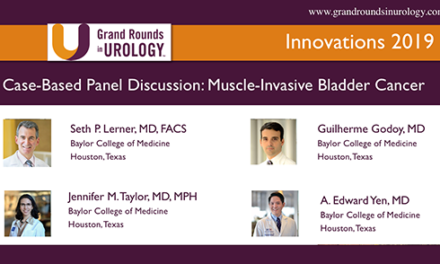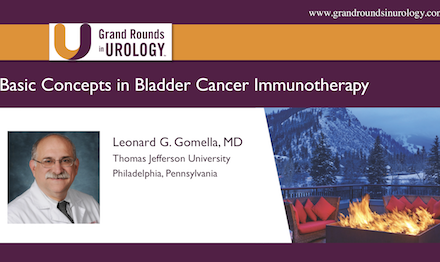Robert R. Dreicer, MD, presented “Neoadjuvant Cisplatin-Based Chemotherapy for Muscle-Invasive Bladder Cancer (MIBC)” during the Perspectives in Urology: Point Counterpoint 2020 virtual conference in November 2020.
How to cite: Dreicer, Robert R. “Neoadjuvant Cisplatin-Based Chemotherapy for Muscle-Invasive Bladder Cancer (MIBC)” November 2020. Accessed Apr 2025. https://grandroundsinurology.com/neoadjuvant-cisplatin-based-chemotherapy-for-muscle-invasive-bladder-cancer/
Neoadjuvant Cisplatin-Based Chemotherapy for Muscle-Invasive Bladder Cancer (MIBC) – Summary
Robert Dreicer, MD, MS, MACP, FASCO, Associate Director for Clinical Research and the Deputy Director of the University of Virginia Cancer Center, discusses phase 3 study evidence in support of cisplatin-based chemo which he argues is a secure alternative to immune-checkpoint inhibition, a more experimental treatment. He begins by paralleling support of immune-checkpoint inhibition to other oncological examples of physician claims of “I already know the answer.” Dr. Dreicer reflects on the 90s, specifically on the recommendation of high dose chemo for advanced breast cancer prior to the completion of studies. Once the studies were completed it became clear that high dose chemo did not demonstrate an improvement in treatment and may in fact have proved itself mostly harmful. He continues by reviewing a randomized trial comparing long-term survival results of patients treated with gemcitabine plus cisplatin against methotrexate, vinblastine, doxorubicin, and cisplatin in patients with bladder cancer. The trial found that cisplatin-based chemo had a 15.3% response rate. Dr. Dreicer overviews a phase 3 trial which found that cisplatin-based therapy reduced risk of death by 16%, corresponding to an increase in 10-year survival from 30% to 36%. He concludes with an argument for cisplatin-based treatment due to the availability of higher-quality evidence for its use than immune-checkpoint inhibition.
Click here for the immune-checkpoint inhibition perspective of this point-counterpoint series.
About the Perspectives in Urology: Point Counterpoint 2020 virtual conference:
Presented by Program Chair and Grand Rounds in Urology Editor-in-Chief E. David Crawford, MD, as well as Program Co-Chair Dan Theodorescu, MD, PhD, this virtual conference brought together leading experts in urology, medical oncology, and radiation oncology to discuss and debate the latest topics in genitourinary cancers, primarily prostate cancer and bladder cancer. This two-day interactive conference offered topical lectures, pro/con debates, interesting-case presentations, interactive panel discussions, and interactive audience and faculty networking. A focus on prostate cancer was given on Wednesday, November 11th, with a focus on bladder cancer given on Thursday, November 12th.
ABOUT THE AUTHOR
Robert Dreicer, MD, MS, MACP, FASCO, is the Associate Director for Clinical Research and the Deputy Director of the University of Virginia Comprehensive Cancer Center in Charlottesville, Virginia. He serves as Section Head of Medical Oncology and Co-Director of the Paul Mellon Urologic Institute. He is also a Professor of Medicine and Urology at the University of Virginia School of Medicine. He previously served as Chair of the Department of Solid Tumor Oncology at the Cleveland Clinic. Dr. Dreicer is board-certified in internal medicine and oncology and he specializes in the management of genitourinary malignancies, as well as the design and conduct of clinical trials in urologic oncology. Dr. Dreicer received his BS from Colorado State University and his MS from the University of Texas Graduate School of Biomedical Science in Houston, Texas. He received his MD from the University of Texas Medical School in Houston before completing an internal medicine residency at Indiana University in Indianapolis. He then went on to a medical oncology fellowship at the University of Wisconsin Carbone Clinical Cancer Center in Madison, Wisconsin. Dr. Dreicer has published widely in genitourinary oncology and served as principal investigator of a large number of studies in genitourinary neoplasms. He served as Co-chair of the National Cancer Institute Genitourinary (NCI GU) Steering Committee from 2012-2018 and is a member of the editorial board of the New England Journal of Medicine Journal Watch Hematology/Oncology and the American Board of Internal Medicine (ABIM) Medical Oncology Longitudinal Test Assessment Committee.




